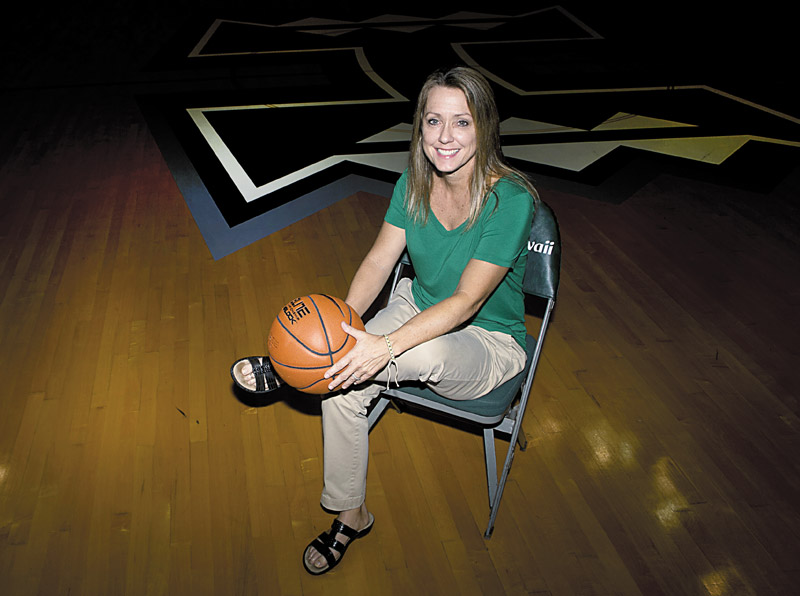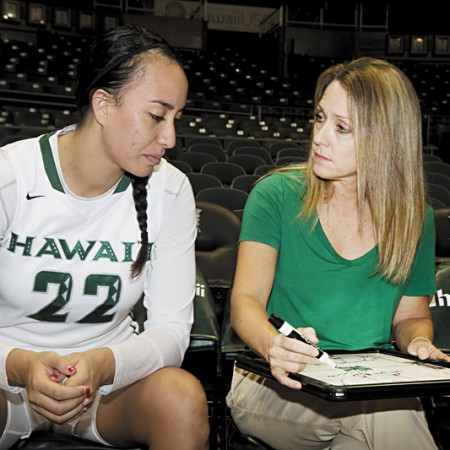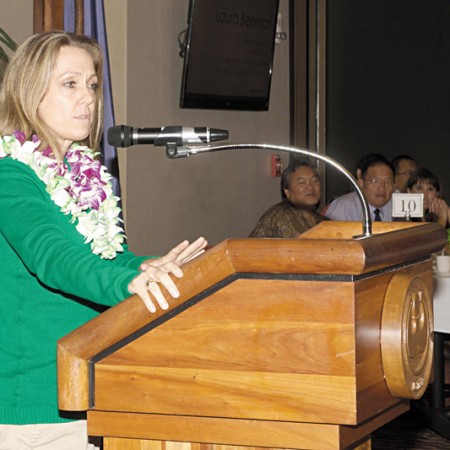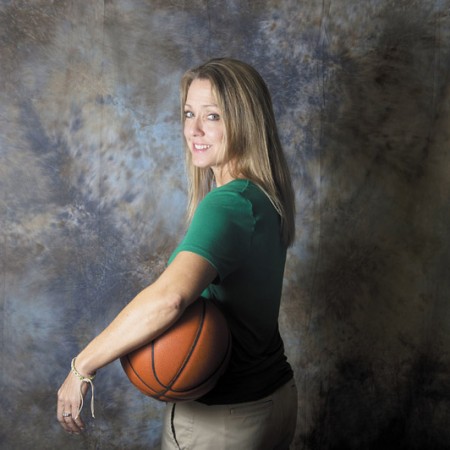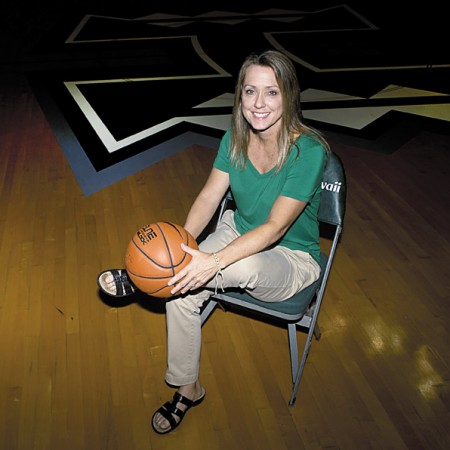It’s not OK to be OK
Six words sum up coach Laura Beeman’s philosophy of basketball and are at the center of the remarkable turnaround she has performed on the once-beleaguered University of Hawaii Rainbow Wahine basketball program: “It’s not OK to be OK.” Just a few short years ago, they were borrowing volleyball players to fill out their roster, losing at twice the rate they won and residing in the basement of the Big West. Perhaps the worst part of all was not the losing, but that no one seemed to care.
- Coach Beeman discusses offense strategies with senior Ashleigh Karaitiana
- Rainbow Wahine basketball coach Laura Beeman was the keynote speaker at the Friends of Scouting leadership breakfast Dec. 10 at Waialae Country Club
Enter Beeman, an All-American player (albeit at the Division II level, she is quick to point out), four-time winner of the California Community College State Championship and an assistant coach for the WNBA Los Angeles Sparks, and most recently at USC.
Former AD Jim Donovan took one look at her resume and flew her out the next day. At the end of the interview he offered her the job on the spot, and the state of Hawaii has been the beneficiary ever since.
In her first three years, she posted three straight winning records with a remarkable 23-9 mark last year, winning the Big West while going 14-2 in conference.
So how did this California native return the Wahine to winning ways?
“Change the culture,” says Beeman. “When I walked in, I did a lot of listening to the players: ‘Why is it that you are not winning, because you are talented?’ It was a culture of mediocrity, a culture of it is OK to be OK.
“That was the running theme for the first year: It is not OK to be OK. Let’s make a change, and the change needs to be: You can’t just want something. You have to do what it takes to get what you want. And that is not by being average, that is going above and beyond, putting effort in and believing in yourself. Do not accept mediocrity. Do not let people treat you as average.”
- Laura Beeman
- Those six words are the key to the amazing turnaround for the UH women’s basketball team since coach Laura Beeman took over
These are great sentiments, but to get a team that is used to going through the motions to buy in, it takes a leader who shows it through her actions, and Beeman quickly showed she was not going to be intimidated by anyone, least of all the men’s team or the hallowed volleyball program.
“It was about not taking a crappy practice time just because the men’s coaches say this is what you are going to do,” says Beeman, who speaks with the fervor of a preacher. “Fighting for my team publicly with the men’s coach, saying, ‘No. You don’t talk to me or my players that way.’ When young women see that, they say, ‘Hey, let me puff my chest out too. We have a leader who wants to be good and knows how to do it, so let’s follow her.’
“It is hard, but worth the effort because we were able to change things pretty quickly — really reinforced what these ladies wanted to be from day one, which is they want to be winners. We want people to recognize us as winners, not just as that basketball team that is not Wahine volleyball.”
Helping the attitude change also sometimes comes through seemingly superficial improvements. Much like Mayor Rudy Giuliani knew that changing New Yorkers’ attitude toward crime could be as simple as painting over graffitied subway cars, Beeman knew that by cleaning up their locker room she could help change the culture.
A couple coats of paint, a TV, a sound system and some bean bag chairs, and she transformed a room they previously looked at as a mere uniform storage facility into their bunker for the battles to come.
“This is yours,” Beeman said to the players of the locker room. “This is your home away from home. Yeah, your dorm is yours, but this is where family issues take place. You are not going to go to your dorm room and have a team conversation.
“You need to have a place you can come and be the basketball player, and hash it out and talk as a team, and have the vulnerable, intimate safe moments you need as a team without thinking someone is overhearing what you are talking about.”
This commitment to each other comes off the court as well. Beeman is keenly aware of how difficult a situation it can be to be so far from home, as this is her first time living outside of California. She has the team over for movie nights at her home, and creates team-building events like beach excursions, hikes and ziplining.
It is this family-type connection that Beeman relishes about the college game as opposed to her pro experience, where basketball was purely a business.
“I love the relationships I can build with these ladies that become lifelong relationships,” says Beeman. “I can see them grow and mature, and watch them develop into young women and go on to get married, have kids if they want to, get a degree, start a job and see the change and having been a part of it, it is very satisfying, very rewarding.”
Recruiting the right kind of kids can be a challenge with the remoteness of the islands, but Beeman is not scared to scour the Earth to find them.
“We want good-character kids, whether they come from Tennessee or Tasmania, who understand what it is to represent the state of Hawaii because this is a very unique place,” says Beeman. “It takes a certain kind of personality. You have to be able to live away from home on an island. Life isn’t always easy over here based on the resources we have. You cannot go see a pro game or go to an ESPNZone.”
Representing the state goes beyond putting the ball in the hoop. Beeman makes a point of having the players give back to the community through homelessness out-reach, Special Olympics or volunteer work at Waikiki Health’s Youth Outreach program for at-risk youth.
“We are a tight-knit community here in Hawaii, and what we do needs to resonate throughout the community,” says Beeman, who also donates all the leis from Senior Night to an assisted-living home in Hawaii Kai.
“You don’t get something for nothing. If you want people to come and support you, besides playing great basketball, you have to let them know that you are giving back to your community. I am not an entitlement person — that is something that drives me crazy. People need to work for things.”
The changes in the culture have not gone unnoticed by the business community. This Wednesday (Dec. 16), local supporters are holding the inaugural Hoopla, a fundraiser to benefit the Rainbow Wahine basketball team. It will be held at Hukilau Honolulu and offer food from Murphy’s Bar and Grill and JJ Dolan’s, local entertainment, and featured wines and beers. Despite it being its first go-round, the support has been incredible.
“We now have 25 corporate sponsors at the $1,500 level for the event,” says Don Murphy, longtime backer of UH athletics and one of the organizers of the event. “We can’t even get that many for the Pigskin Pigout (his annual fundraiser for the UH football team). The business community really believes in her. They know how lucky we were to find this diamond in the rough.”
The fact that these business leaders brought the idea to Beeman really impressed her.
“I don’t know if I can thank them enough or express how much it means to have someone step up to help,” says Beeman. “Usually you have to approach people: ‘Will you host an event for me?’ These guys said, ‘We want to help you.’ They approached me, and I just thought this was tremendous.”
Kurt Osaki, president of Osaki Creative, is hosting Hoopla, and has been blown away by Beeman since the first time he met her and got a sense of her priorities.
“What we all forget is that this is all about the student-athlete,” says Osaki. “When I sat down and talked with Laura, I could really feel her heart. She cares so much about these kids and she cares so much about Hawaii, and we just wanted to help her to continue to do these things.”
Tickets were still available as this went to press. They cost $100 and can be purchased in person at Hukilau, Murphy’s or JJ Dolan’s, or online at wahinebasketballhoopla.com.
PHOTOS BY NATHALIE WALKER

